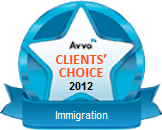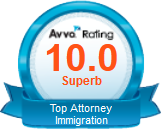Employment Visa
CHALLENGES OF THE BIDEN ADMINISTRATION IN 2022
WE FIGHT FOR YOUR RIGHT TO WORK WHERE YOU WANT
We are now working in a challenging environment under the Biden Administration. Therefore, the need for an experienced Immigration Attorney like Eli Kantor is greater than ever.

Employment-Based Immigration
Foreign nationals who want to become U.S. Legal Permanent Residents have the option of doing so through a permanent, full-time, job offer in the United States. There are four categories for granting permanent residence to foreign nationals based upon employment:
EB-1 (Priority Workers)
- Foreign nationals of extraordinary ability in the sciences, arts, education, business or athletics, including entertainers
- Foreign nationals that are outstanding professors or researchers
- Foreign nationals that are managers and executives subject to international transfer to the United States
* For EB-1 priority workers, the foreign national or employer is not required to obtain a labor certification first, and can directly file Form I-140.
EB-2 (Professionals with advanced degrees or persons with exceptional ability)
- Foreign nationals of exceptional ability in the sciences, arts or business
- Foreign nationals that are advanced degree professionals
- Qualified alien physicians who will practice medicine in an area of the U.S. which is underserved
EB-3 (Skilled or Professional Workers)
- Foreign national professionals with bachelor’s degrees (not qualifying for a higher preference category)
- Foreign national skilled workers (minimum two years work experience)
EB-4 (Special Immigrants)
- Foreign national religious workers
- Employees and former employees of the U.S. Government abroad.
* For EB-4 special workers, the foreign national or employer is not required to obtain a labor certification first, and can directly file Form I—360.
Labor Certification-PERM
The EB-2 and EB-3 employment-based immigration categories require that the U.S. employer complete a labor certification request (also known as “PERM”) for the applicant, and submit it to the U.S. Department of Labor, in order to show that there were no qualified U.S. workers to fill the position being offered. Once this is approved, then the U.S. employer files an immigrant visa petition, Form I-140, Petition for Alien Worker, for the person wishing to immigrate to the United States. After the I-140 is approved, the foreign national can apply for U.S. Legal Permanent Residency.
If the applicant is already in the United States, he or she can apply to adjust to permanent resident status after a visa number becomes available, based on their country of nationality, the date their case was filed and the category they are in. (Please refer to the “Resources” on our site for the U.S. Department of State’s monthly Visa Bulletin.)
If the applicant is outside the United States, then when an immigrant visa number becomes available, he or she will be notified and must complete the process at his or her local U.S. Consulate.
Non-Immigrant Employment Visas
H-1B Professional Workers
- Only 65,000 new H-1B visas will be available for the upcoming fiscal year, plus 20,000 for those with Masters Degrees.
- We urge all employers who wish to sponsor a foreign professional to contact our office now, since the applications must be filed by April 1st
The H-1B nonimmigrant visa category allows foreign workers in specialty occupations (and fashion models and foreign medical graduates) to seek temporary employment in the United States. The foreign worker must be “sponsored” by the U.S. employer and must possess a minimum equivalent to a U.S. Bachelor’s Degree.
There is an annual cap of 65,000 H-1B visas per year. (6,800 of those are set aside for foreign workers from Chile and Singapore.) However, foreign workers possessing an advanced degree (Master’s Degree or higher) from a U.S. university have a separate cap of 20,000 visas per year. The cap does NOT apply to those foreign workers already in H-1B status who are seeking to extend status or change employers. The cap also does NOT apply to those foreign workers being sponsored by an institution of higher education; a nonprofit organization or entity related to or affiliated with an institution of higher education; or a nonprofit research organization or governmental research organization.
Significantly, all of the H-1B visas are normally used up during the week of April 1st and then a lottery is conducted to determine who will receive them for that year. Therefore we urge all employers who wish to sponsor a foreign professional to contact our office far in advance of the April 1st filing date.
Immigration has vowed to crack down on alleged abuse of the H-1B visa program. Therefore, it is urgent that you apply now, before the H-1B program is limited.
Success Stories
A law firm had filed an H-1B for a “law clerk”. Immigration sent them a long and detailed Request for Evidence “RFE” claiming that there was no “law clerk” position in the Department of Labor’s Dictionary of Occupational Titles, only Lawyers or Paralegals or Legal Assistants. They claimed that the position of Law Clerk only applied to someone who was working for a judge. The law firm contacted us and we were able to creatively overcome the RFE. The employee did not have to leave the country and is now working for the law firm.
An employer had filed an H1-B for a “Product Manager” as a Wage Level 1. Immigration sent them a long and detailed Request for Evidence “RFE” claiming that if she was a Level 1 entry level position, then there was no need for having a college degree, and therefore, it was not a specialty occupation. We were able to convince Immigration that since she was being closely supervised in all of her job duties, then she was correctly classified as a “Level 1”. Thus, her H-1B visa was approved.
CALL US NOW AT (310) 274-8216 TO SEE IF YOU WILL QUALIFY FOR AN H-1B VISA.
Spouses and children (under the age of 21 years old) of the foreign worker are eligible for an H-4 visa, which is valid for the duration of the principal applicant’s H-1B status. Thanks to a change in the law, spouses of H-1B holders, who obtain H-4 visas can now obtain work authorization.
Other alternatives to the H-1B visa include, but are not limited to, the TN (Canadian or Mexican nationals only), E-3 (Australian nationals only), L (multi-national executives or managers, or those employees with specialized knowledge) or E (treaty-trader or treaty-investor) visa.
H-1B-1 (Chile and Singapore)
This is a special type of H-1B visa for nationals of Chile and Singapore only. There are 1,400 visas set aside for Chile and 5,400 for Singapore.
E-3 (Australian Nationals Specialty Occupation Workers)
This is a new visa category, similar to the H-1B visa, but specifically for Australian nationals to perform specialty occupation services in the United States. The period of admission is 2 years, with up to 2 years per extension, with NO maximum number of extensions.
TN (Mexican and Canadian National Professionals Pursuant to NAFTA)
This visa is reserved for Mexican or Canadian nationals who intend to enter the United States on a temporary 3 year basis in an occupation enumerated under the North American Free Trade Agreement. This visa may be extended in 3 year increments, but the foreign worker CANNOT have intent to immigrate.
L-1A / L-1B (Multi-National Executives / Managers or Employees with Specialized Knowledge)L-1A: This category is utilized when a foreign company’s executive or manager will be transferred to a U.S. branch, subsidiary or affiliate company. The executive or manager must have worked for the foreign entity for 1 out of the past 3 years. The period of admission is up to 3 years (those coming to open a new office in the U.S. are usually only granted 1 year to start), with extensions not to exceed a total period of stay of 7 years.L-1B: This category is limited to “specialized knowledge employees” who have worked for the foreign company abroad for at least 1 year in the last 3 years, and will be placed at a U.S. branch, subsidiary or affiliate office. The employee must possess either: special knowledge of the company product and its application in international markets, or has an advanced level of knowledge of processes and procedures of the company. The period of admission is up to 3 years (those coming to open a new office in the U.S. are usually only granted 1 year to start), with extensions not to exceed a total period of stay of 5 years.
H-3 (Trainees)
This category is utilized by U.S. companies and institutions in order to bring foreign nationals to the U.S. to participate in an existing training program, which is unavailable in the foreign national’s home country. The training program may not last for more than 2 years in duration, and the trainee may not engage in productive employment. The training of the foreign national cannot be used with the intention of employing them in the United States.
J-1 Trainee Visas
The J-1 Trainee Visa program exists to allow qualifying individuals to live, work and learn in the United States for a limited amount of time. Only those companies that receive designation by the Department of State as a J-1 visa program sponsor are eligible to act as a host company for J-1 Visa recipients. It is necessary to find a sponsor organization which can issue a Certificate of Eligibility for J-1 Training after a thorough review of the training program proposed by the host company; this process can take 1-2 months.
I-9 Audits
The Trump administration has announced an increase in workplace enforcement, inspecting I-9 forms, as well as workplace raids. Recently, ICE raided 100 7-11s, including several in California At the same time, the State of California has enacted a new law effective January 1, 2018, limiting employer cooperation with ICE. Under AB 450, California’s public and private employers will be prohibited from voluntarily consenting to a federal immigration enforcement agent’s request to enter non public areas in the workplace or to voluntarily allowing the agent access to employee records unless the agent provides a judicial warrant. Employers must also provide notice to employees as follows:
- Pre-Inspection Notice: Within 72 hours of receiving a federal immigration agency’s notice of inspection (“NOI”) of employment records, including I-9 Employment Eligibility Verification forms, an employer must provide notice to each of its current employees. The posted notice must include (1) the name of the immigration agency conducting the inspection; (2) the date the employer received notice of the inspection; (3) the nature of the inspection to the extent known; and (4) a copy of the NOI. On or before July 1, 2018, the Labor Commissioner will create a template of this notice for employers to use.
- Post-Inspection Notice: Within 72 hours of receiving written notice of an immigration agency’s inspection results, an employer must provide each affected employee (and his/her collective bargaining representative, if any) with written notice of the results. The notice must include (1) a description of any and all deficiencies or other inspection results related to the affected employee; (2) the time period for correcting any deficiencies identified by the immigration agency; (3) the time and date of any meeting with the employer to correct the deficiencies; and (4) notice that the employee has a right to be represented during any scheduled meeting with the employer. The notice must be tailored to the affected employee and hand-delivered the employee at the workplace. If this is not possible, the employer must endeavor to mail and e-mail the employee and the employee’s labor union, if applicable.
Thus, California employers are now stuck between the proverbial “rock and a hard place” trying to comply with the Federal Law 274A of the INA requiring completion of Form I-9 for all employees, and allowing for ICE inspection and the new California laws limiting employers’ cooperation with ICE. Mr.Kantor’s unique perspective as both an immigration and employment lawyer can help you “thread the needle” through these conflicting laws.




